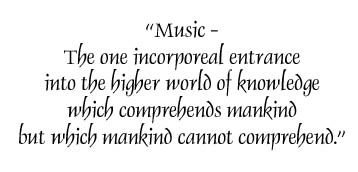Ludwig van Beethoven (b. December 16, 1770, d. March 26, 1827) was born in Bonn, located in what is now called Germany, into a musical family. He studied under Mozart, Salieri and Haydn (as well as others) in Vienna when he was older, specializing in the piano, particularly its evolution to our modern concert grand. He was by all accounts an amazing pianist - fiery and passionate, as well as gifted.

By 1798 Beethoven realized he had a hearing problem (which he began to admit to friends in 1801) and eventually, by 1817, he became completely deaf - he could never hear his Symphony No. 9, written in 1823. His growing deafness meant that he couldn't perform publicly as a virtuoso pianist anymore and thus he turned to composing mainly. He composed over 200 works: 9 symphonies, 5 piano concertos, 32 piano sonatas and several chamber pieces and string concertos. Most of his best-known and admired works were written after he came to terms with his disability (although that isn't to discount his earlier works, some of which I really enjoy). He penned a famous letter, called the Heiligenstädter Testament, to his brothers in late 1802, wherein he poured out his heart and vowed to fight on despite his loss of hearing.
He never married, although he did help raise his nephew, Karl. In July of 1812, he wrote a beautiful, yet sad letter to someone referred to only as "Immortal Beloved". Whoever this woman was, she didn't receive the letter - it was found in a secret drawer after Beethoven's death. The fallout from the failure of that relationship can be seen in the darkness of his later works, the Symphony No. 9 excepting.

Listed below are more detailed pages on some of my favorite Beethoven works:
♫ Violin Sonata No. 9 in A Minor, Op. 47, "Kreutzer"
